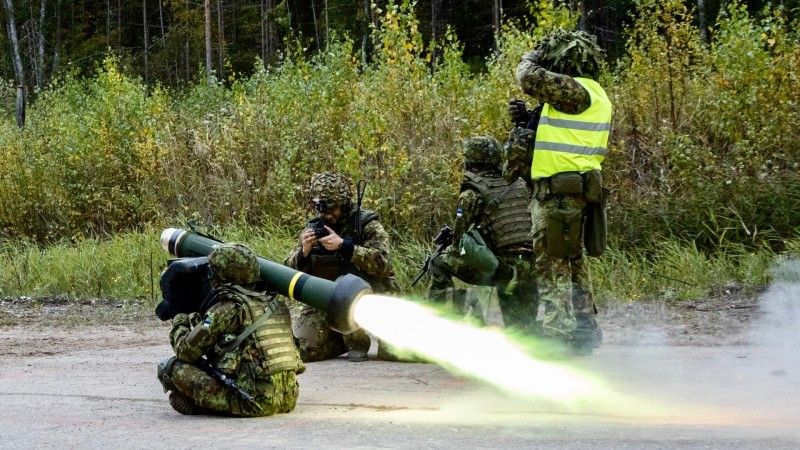Geopolitics
Poland and the Baltic States – the wall that stops Russia [interview]

Photo. Eesti Kaitsevägi
The topic of the Russian influence over the Eastern European countries has been brought up many times since 2014. It was also defined as the main challenge for the Alliance. It is true that currently Ukraine is backed up by many NATO countries, however, regarding the GDP, no one can compare the help given by Poland and the Baltic States. At the same time, the threat from the Russian Federation is growing, and for this reason, all Baltic countries are strengthening national defence. It seems that almost all ties with Moscow were cut, and Ukraine might not be the last aim of Putin’s regime.
The Baltic States and Poland have a fairly consistent policy towards Ukraine. They have already provided enormous support, and will continue to actively participate in international efforts to end the war. Moreover, the main goal is the Ukrainian accession to the EU and NATO structures. For many countries in the West, the attitude of Lithuania, Latvia, Estonia and Poland may be an example of a valuable allies in the midst of a crisis. The truth is that countries from the eastern land border of NATO - through help to Ukraine - are strengthening their own borders, keeping the Russian aggression at a distance.
Thoughts on this issues, specially for Defence24, shared by Ramon Loik – a former Advisor to Estonian Minister of the Interior (2017–18). He also worked as Advisor to Estonian Minister of Defense (2002–3) and served as Vice–Rector of Estonian Academy of Security Studies (2010–15). His main academic field of research covers security policy and integration in European Union, especially transnational internal security and law enforcement cooperation domain. Currently, affiliated with the International Centre for Defence and Security in Estonia.
Aleksander Olech: Do the Baltic states perceive Poland as a main supporter of Ukraine and an indispensable element to sustain Ukrainian sovereignty?
Ramon Loik: In my opinion, they do. On 24 February 2022 – the very first day of the Russia's military aggression against Ukraine – the National Bank of Poland offered Ukraine financial assistance up to 4 billion zł (875 million US dollars). The total cost of the various military assistance and social support given to Ukraine by Poland is estimated to reach approximately 0,5% of its GDP. More than 1.5 million Ukrainian war refugees are estimated to be staying in Poland, including 1.2 million who have already registered for protection. This is more than double any other EU country. So, the Polish support to Ukraine is undoubtedly very large. However, Estonia has also allocated support to Ukraine around 0,8% and Latvia more than 0,7% of their GDP-s. Thus, both Poland and the Baltic states are Ukraine\`s closest and biggest supporters.
Aleksander Olech: From the Estonian perspective: why is Poland so involved (politically, militarily, economically, socially, etc.) in this Ukrainian-Russian war? It must be said that we are starting to be overloaded.
Ramon Loik: Poland is the biggest NATO and EU neighboring country for Ukraine. Poland and Ukraine share more than 500 km land border, which is the most often crossed eastern border of the European Union. There are approximately 4 million people live on both sides of the border area, and the Polish voice is heard internationally. Thus, Poland's support for Ukraine is vitally necessary, and other NATO and EU member states should fully consider Poland\`s expertise in providing assistance to Ukraine.
Looking back to Russia's hostile influence operations before the ongoing invasion, the Polish-Ukrainian relations were one of the most intensively targeted domains. Kremlin troll factories and state-controlled media outlets aimed to undermine and damage the Polish support for Ukraine as much as possible. We know that they failed. They failed largely because, since the military aggression against Georgia and annexation of Crimea, both Poland and the Baltic states have actively informed the governments of NATO and EU member states and the public about Russia's hostile information influence activities.
Aleksander Olech: Can we admit that Poland and the Baltic states are helping Ukraine because they are indirectly trying to prevent Russia from moving further to the West? Is this a smart strategy, or is it better to wait and count on NATO eFP?
Ramon Loik: There is no time to wait to give full support to Ukraine. Looking at Russia's history, its imperialistic ambitious have always been there. This is only a matter of an 'opportunity window' when Kremlin pushes ahead, as much as possible. Russia's doctrinal thinking is an offensive realist one, which means that our defence planning and readiness must always derive from the worst-case scenario. Poland and the Baltic states, empowered soon by Finland and Sweden, must keep NATO's and EU's action-lines focused on Ukraine and on accelerated capability-building to restrain the Kremlin's aggressiveness.
